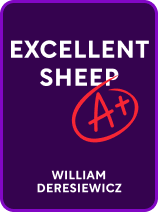

This article is an excerpt from the Shortform book guide to "Excellent Sheep" by William Deresiewicz. Shortform has the world's best summaries and analyses of books you should be reading.
Like this article? Sign up for a free trial here.
What is the purpose of college? Is it to educate students or to generate profits?
In Excellent Sheep, author and former Yale professor William Deresiewicz makes the case that elite U.S. colleges and universities prioritize profits over education. They have prestige, but they don’t provide the high-quality education you’d expect.
Keep reading to understand Deresiewicz’s argument.
Problem: Elite Schools Prioritize Profits Over Teaching
What is the purpose of college? Deresiewicz believes it should be teaching and learning. But, he contends that elite colleges operate as though their purpose is to turn a profit. He contends that they provide a low-quality education because they prioritize generating profits that ensure their future existence. We’ll explore two ways elite schools prioritize profits over teaching. Then, we’ll investigate how this emphasis harms students and society.
Method 1: Elite Schools Treat Students as Customers
The first way elite schools prioritize profits over teaching is by treating students like customers instead of learners. Deresciewicz argues that elite schools prioritize students’ customer satisfaction because, as previously noted, they rely on upper-class students’ financial support. These students’ families are more likely to pay full tuition, and they and their families are more likely to later become donors. Elite schools treat prospective students like customers by attracting them with unnecessary perks (such as free laundry service) that don’t improve the quality of education.
(Shortform note: Research on college budgets reveals that when elite schools invest in efforts to attract wealthy students, it leaves less funding for financial aid. This reduces non-elite students’ access to these colleges. In a podcast episode, journalist Malcolm Gladwell, author of Outliers, compared how two elite colleges allocated their funds. One college invested in top-tier dining hall food and offered less financial aid; the other provided mediocre dining hall food and offered generous financial aid. In analyzing these schools’ different approaches to budgeting, he argued that elite schools should prioritize making college more accessible to low-income students over efforts to attract high-income students.)
After students are admitted, elite schools maintain their customer satisfaction in two ways. First, they praise them excessively for their exceptional abilities. Second, they engage in grade inflation: giving them higher grades than they deserve.
| The Harmful Effects of Grade Inflation and Ability-Based Praise Research shows that grade inflation harms students by reducing their resilience in the face of challenges. Because of grade inflation, students don’t have to work as hard to do well. This reduces their stamina for challenges, leaving them ill-equipped to deal with the demands of post-college life. Praising students for their abilities also weakens their resilience. Psychologist Carol Dweck, author of Mindset, found that teens praised for their ability performed worse on tasks than teens praised for their effort. Those praised for their ability avoided challenging tasks that could promote their learning because they feared exposing flaws in their abilities. By contrast, teens praised for their effort opted for these challenges: Effort-based praise motivated them to continue working hard. These findings are true for college students as well, suggesting that college professors can support students’ academic growth by praising them for their effort instead of their abilities. |
Method 2: Elite Schools Incentivize Research Over Teaching
A second way elite schools prioritize profits over teaching is by overemphasizing research. Deresiewicz argues that because professor-led research brings in funding, elite schools reward professors for research more than for teaching. These institutions incentivize a research focus through their tenure track system. When a committee decides whether to grant a professor a tenure track position, they give more weight to their research publications than to their strengths as a teacher.
(Shortform note: Research reveals that elite schools’ overemphasis on research not only compromises students’ learning but also compromises the quality of professors’ research. Institutions are more likely to reward tenure to professors who publish more research since this is a straightforward way to assess their performance. This emphasis on quantity reduces quality: Because professors rush to produce more research, their findings sometimes promote false conclusions. To remedy this, experts recommend rewarding professors for producing research that improves society over producing more research.)
Next, let’s explore how elite schools’ focus on profits harms both students and society.
Impact 1: Students Have Limited Opportunities for Self-Insight
First, Deresiewicz argues that, because research is so time-consuming, professors are unavailable to provide students with experiences that encourage self-insight and character-building. Professors, and less-experienced instructors hired to relieve them of their teaching obligations, provide students with facts and conclusions instead of opportunities to develop their own insights and conclusions.
The author argues that this model of teaching harms both students and society. As previously noted, when students lack opportunities for character-building and self-insight, they graduate less prepared to build a meaningful life and they’re ill-equipped to uphold democracy.
| The Benefits of Involving Students in Research Deresiewicz frames research as a negative aspect of professors’ work that pulls them away from students and compromises students’ character-building. However, professor research and student learning may be less mutually exclusive than he portrays. Many elite institutions offer hands-on opportunities for students to learn by assisting professors with their research. For example, Harvard University offers summer science research opportunities for undergraduates. Studies have shown that faculty-student research collaborations such as these build students’ character. More specifically, these opportunities increase students’ curiosity and develop both their communication and collaboration skills. |
Impact 2: Elite Schools’ Messages About Meritocracy Threaten Society
Deresiewicz argues that elite schools’ treatment of students as customers reinforces harmful myths about meritocracy that perpetuate social inequality. A meritocracy is a system founded on the belief that people with high merit (academic strengths and talents) should have the most financial and political power.
The author claims that, when elite schools shower their customer-students with praise about how exceptional they are, it sends students the message that they earned their place in the meritocracy. However, this message is a myth. The U.S. isn’t a meritocracy because, as previously noted, affluent students with merit have more access to elite schools than non-affluent students with merit. This myth of meritocracy obscures the truth that social inequality, not lack of merit, excludes non-elite people, making it less likely that this inequality is addressed.
(Shortform note: Recent research supports Deresciewicz’s claim that unawareness of social inequality—in this case, unawareness created by the myth of meritocracy—further perpetuates that inequality. One simulation-based study found that when people playing the role of policymakers were unaware that taxpayers’ low incomes led them to pay minimal taxes, they assumed these taxpayers didn’t care about the public good. The roleplayers then punished the taxpayers with additional taxes. By contrast, when the roleplayers were aware of social inequality, they had the opposite reaction: They raised taxes on wealthier taxpayers. These findings suggest that awareness of social inequality influences peoples’ choices about wealth redistribution.)
Solution: Prioritize Teaching and Learning
Next, let’s consider solutions to the second problem with elite schools: their emphasis on profits over teaching. Deresiewicz offers recommendations for how colleges and universities, and college students themselves, can improve students’ educational experience. In this section, we’ll share his recommendations.
College and University Role: Prioritize Teaching
The author argues that elite schools should ensure that professors prioritize teaching over research. Shifting professors’ priorities would enable them to build students’ character and nurture their self-insight. As previously noted, their inspiring guidance would both enrich students’ lives and equip them with the skills to uphold democracy. The author argues that, during the tenure evaluation process, professors’ teaching experience and strengths should be valued just as much as, or more than, their research experience.
| The Role of Student Evaluations in Professors’ Teaching Quality One way colleges and universities can value professors’ teaching is by reducing the role student evaluations play in assessing professors’ performance. A recent study found that teaching quality suffers when administrators overemphasize students’ evaluations of their professors. This mode of evaluation reduces the quality of teaching because students tend to highly rate professors who amuse them, assign little work, and inflate their grades. By contrast, they give low ratings to professors who grade students accurately and provide rigorous teaching. Instead of emphasizing student evaluations during the tenure review process, schools could consider other evidence to evaluate teaching quality, such as video recordings of professors’ lessons. |
Student Role: Prioritize Learning Over Prestige
Deresciewicz claims that college-age students don’t need to wait for these systemic changes to happen before they can experience a high-quality education. He urges students to actively create a high-quality education for themselves. Specifically, he encourages them to undermine the priorities of elite schools by prioritizing learning over prestige. By seeking experiences that prioritize learning, they can experience the benefits of self-insight and character-building. In this section, we’ll share Deresciewicz’s tips for how prospective and current college students can achieve this.

———End of Preview———
Like what you just read? Read the rest of the world's best book summary and analysis of William Deresiewicz's "Excellent Sheep" at Shortform.
Here's what you'll find in our full Excellent Sheep summary:
- How elite colleges contribute to social inequality and harm students
- The ways that elite schools prioritize profits over teaching
- How governments, schools, and parents can overhaul U.S. higher education






